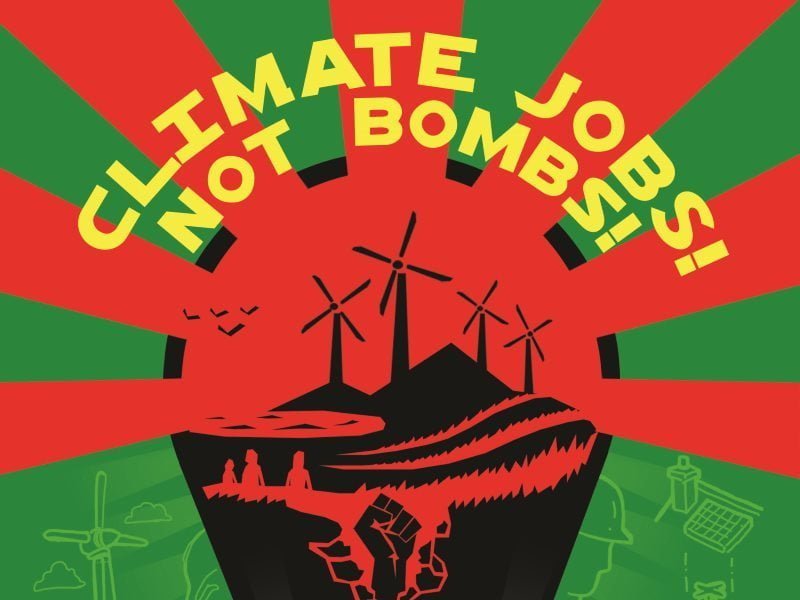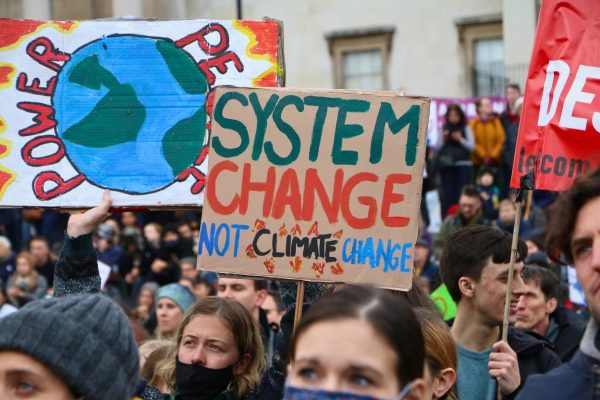In recent weeks, Keir Starmer has been keen to emphasise that Labour will be the party of the ‘green economy’.
On other issues, from law and order to migration, the Labour leader has sought to defend the status quo, and appeal to big business and the ruling class. And the same is true when it comes to energy and environmental policy.
Notably, Starmer has abandoned his previous pledge to nationalise the Big Six energy suppliers. Instead, he is now proposing a publicly-backed clean energy company, GB Energy, which would compete with existing firms.
In short, under Labour, the energy monopolies would be free to continue polluting and racking in bumper profits, while ordinary households foot the bill.
Green capitalism
The crux of Labour’s environmental programme is the creation of a profitable green industrial sector for British capitalism.

Propped up by state support and stimulus, the party’s hope is that investment in green industry and infrastructure would allow UK businesses to be able to compete with those in major rival economies like the US, EU, and China.
Labour’s proposals are an attempt to mimic Joe Biden’s Inflation Reduction Act, with a focus on tax incentives and subsidies for big business.
This is a far cry from the Green New Deal programme pushed under Corbyn, which concentrated on public ownership and democratic control of the energy sector.
In any case, revealing the weakness of British capitalism, shadow chancellor Rachel Reeves has already begun to roll back on Labour’s strategy, announcing cuts to the party’s £28bn green investment pledge in the name of ‘economic responsibility’.
In other words, capitalism’s demand for austerity trumps any concern for the environment.
Empty promises
Reeves and Starmer have branded their economic programme as “securonomics”, promising state intervention to make British capitalism resilient to global shocks.
But propositions such as GB Energy are on deeply shaky foundations. Private energy monopolies – with their enormous stock of assets and capital – would easily outcompete and undercut any new state-backed company.
Similarly, trying to incentivise the capitalists to invest in green technology through tax breaks and government handouts would mean handing the bosses a blank cheque, with no guarantee of any returns.
Empty promises from big business about a ‘green transition’ have proven time and again to be just that: so much hot air.
The reason is simple: profit-seeking corporations cannot be made to invest. At the end of the day, you cannot plan what you don’t control; and you cannot control what you don’t own.
We can’t trust the bosses to save the environment. It is they and their system that is killing the planet. The capitalists don’t give a damn about tackling climate change. Their only priority is profit.
In reality, therefore, Labour’s pledges will just mean more greenwashing and profiteering by big business.
Instead of subsidising the capitalists’ profits, we must fight to expropriate the incredible wealth and resources that they currently possess, and plan these along socialist lines for the benefit of workers, society, and nature.
Jobs vs environment
As part of their environmental programme, Labour has also pledged to ban new licences for oil and gas production.
Unsurprisingly, this has sparked a backlash from the fossil fuel giants, who have cynically cried crocodile tears about the threat that this ban would pose to the jobs and livelihoods of workers in the energy industry.
Showing just how shallow his green ‘principles’ are, Starmer quickly responded by making assurances that “oil and gas are going to be part of the [energy] mix for decades to come, into the 2050s”.
Unfortunately, the fear campaign whipped up by the bosses about defending jobs in obsolete and harmful industries, such as fossil fuels and arms manufacturing, finds an echo amongst the more conservative layers of the trade unions.
The above words from Starmer, for example, were uttered at the recent GMB conference, in response to resistance from the union’s leaders to calls for an end to oil and gas exploration.

Workers in these sectors are right to be sceptical. The legacy of Thatcher’s deindustrialisation and attack on mining communities shows what any ‘green transition’ would look like under capitalism.
So long as the energy monopolies are in the hands of the fat cats, workers know that they could be made redundant at a moment’s notice – thrown on the scrapheap by the anarchy of the market.
The solution is to put control in the hands of workers themselves.
In the 1970s, for example, workers at arms company Lucas Aerospace wrote up a detailed document, known as the Lucas Plan, which outlined how the firm’s factories could be reorganised and repurposed to create socially-useful products, such as healthcare machines and recycling technologies.
The trade unions today should lead the way by launching similar campaigns. This would cut across the false dichotomy of ‘jobs versus environment’.
This, however, means fighting for common ownership and workers’ control of industry, so that workers have the power to implement such plans, in order to protect both their livelihoods and the environment. This is the bold programme that the labour movement must demand.
Fight for socialism
The past year has seen a wave of strikes across the energy sector: from oil rigs, to refineries, to power plants.
The workers waging these struggles can clearly see how parasitic bosses have made a killing from the energy and climate crises. Everyone else, meanwhile, is subject to rising bills and prices, and to attacks on pay and conditions.

Coordinated action across the energy industry would show where the real power in society lies, and would hit the bosses where it hurts: in the profits.
Militant industrial action, in turn, should be backed up with a clear socialist programme: to expropriate the energy monopolies and their assets, without compensation, under public ownership and workers’ control.
On the basis of democratic control over society’s resources, the organised working class would have the power not only to implement Lucas plans and green transitions in their own workplaces, but to transform the economy and society at large, in order to genuinely combat the climate catastrophe facing humanity.
This is the bold vision that the labour movement must fight for: not ‘green capitalism’, but socialist revolution.






